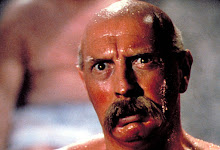
Originally run on 19 October 2009 for the Entertainment page.
Also Sprach Herzog: Fitzcarraldo, Being a Hornet, and Why School is a Waste of Time
The first Werner Herzog movie I ever saw was his documentary on the doomed naturalist Timothy Treadwell in the documentary Grizzly Man. I saw it on a lark with one of my friends and when I walked out, I walked out as a slightly different person. I didn’t know that documentaries could be this engaging, that there was people this crazy walking the earth, and that brooding German lecturing on the chaos inherent in nature made for good movies. Since then Herzog has become one of my favorite directors, so when I heard that there was a screening of his magnum opus Fitzcarraldo, followed up by a question and answer session with the director himself at the Aero Theater in Santa Monica, I jumped on the opportunity (after hunting up the nine dollars for admission). Watching what might be his best film, Fitzcarraldo, and listening to him speak, reaffirmed all of the reasons why I dig Herzog so goddamn much.
The production of Fitzcarraldo is probably every bit as legendary as the film itself (which is about an opera enthusiast, played by Klaus Kinski, who dreams up a scheme to move a steam ship up a mountain). It’s frought with disasters both man-made—such as the original lead actor leaving production half-way through the shoot—and those made by nature— such as a woodcutter who after being bitten in the foot by a snake, cut off his appendage with a chainsaw to keep the venom from spreading to the rest of his body. What results from all of this turmoil is a work of art that was entirely worth it. Even though parts of it are somewhat clunky (like the English dubbing) and the clearing of the woods and use of indigenous workers is morally questionable, it shines past all of this. Even the guy breathing through a tube two rows behind me couldn’t dim the experience. It also didn’t hurt that I was watching this movie for the first time on the big screen—the way the Lord Jesus Christ intended us to watch movies.
The real treat came after the movie concluded, when Herzog spoke about the film. He’s always a man worth listening to. Though he did repeat a few stories I’ve read enough times to feel like he’s told me himself (such as the story of an Indian chief asking him for permission to kill Klaus Kinski, Fitzcarraldo’s lead actor), he touched on a lot of subjects, such as how he believes that our society is “starving for discourse” or that, despite the trouble surrounding Fitzcarraldo, he said that “Any idiot could do it.” I think my favorite quote came when he talked about cinema vérité. He said that he didn’t want to be a fly on the wall,” observing a subject in its natural habitat, but rather, he wanted to be “the hornet that stings.”
Then Herzog capped off the evening by saying something that my parents have been saying for years, which is that my education is a waste of time. This comment came after the second fan of the night asked a question regarding parallels between his other South-American-adventure-film-on-a-river, Aguirre: The Wrath of God, and Fitzcarraldo. He blew off the question, probably half out of being tired of hearing the comparison for nearly thirty years, and mostly because he sees academia as an organization that “vivisects poetry” and that the people who pick apart films like this are “completely without human pathos.” Big talk for someone who stole a camera from the Munich Film School.
I have to disagree with Herzog’s blanket statement of film scholarship being bankrupt, but there’s a tinge of truth in his words. We don’t take in a work of art to tear it apart and poke at the insides, we do it to experience something outside of our normal lives. They show us something more delicate Herzog himself describes as the “ecstatic truth.” This is what film is supposed to do, and Herzog succeeds in this with Fitzcarraldo—even if movie dorks keep on asking him the same stupid film school questions over and over again.
So, while the questions weren’t quite up to snuff and my choice to go to college was assaulted by one of my heroes, I still had a full, worth-while evening because I didn’t feel like I wasted my time, because none of that junk can ever be as magnificent as seeing a ship sail up a mountain on the big screen. Werner Herzog is a guy that we could all probably learn something from. He’s a man driven to tell stories, no matter the hardship. Filmmaking is his vocation he lives up to every ounce of that potential.
Image stolen from Vice Magazine many moons ago.

